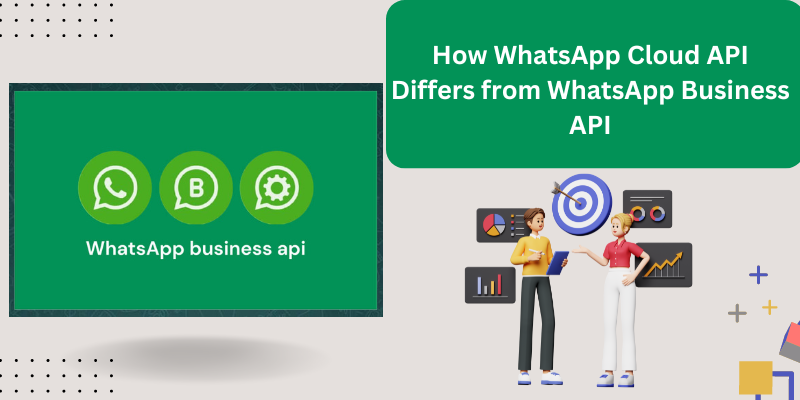As businesses strive to improve customer communication and engagement, WhatsApp offers two powerful solutions: the WhatsApp Business API and the WhatsApp Cloud API. While both APIs are designed to enhance business messaging capabilities, they differ significantly in terms of infrastructure, setup, scalability, cost, security, features, and use cases. This article explores these differences in detail to help businesses choose the right solution for their needs.
Infrastructure and Hosting
WhatsApp Business API:
The WhatsApp Business API requires businesses to host the API on their own servers or through a third-party service provider. This self-hosted model demands substantial technical expertise and resources to manage server maintenance, security, and compliance. Businesses need to ensure their infrastructure can handle the API’s requirements, including message encryption and data storage.
WhatsApp Cloud API:
In contrast, the WhatsApp Cloud API is hosted on Meta’s (formerly Facebook) cloud infrastructure. This eliminates the need for businesses to manage their own servers, simplifying the implementation process. Meta takes care of server maintenance, security, and compliance, allowing businesses to focus on integrating the API with their applications and services without worrying about backend infrastructure.
Setup and Implementation
WhatsApp Business API:
Implementing the WhatsApp Business API can be complex and time-consuming. Businesses must undergo a verification process, configure the API on their servers, and ensure compliance with WhatsApp’s policies. This setup process can be daunting for companies without significant technical resources.
WhatsApp Cloud API:
The WhatsApp Cloud API offers a more straightforward and quicker setup process. Since Meta hosts the API, businesses can start using it almost immediately after the initial setup, which involves fewer technical hurdles. This ease of implementation makes the Cloud API an attractive option for businesses looking for a fast and efficient solution.
Scalability and Performance
WhatsApp Business API:
Scalability with the WhatsApp Business API depends on the business’s server capabilities. As message volumes increase, businesses may need to invest in additional server resources to maintain performance and reliability. This can be a significant challenge for companies experiencing rapid growth or seasonal spikes in messaging activity.
WhatsApp Cloud API:
Scalability is a key advantage of the WhatsApp Cloud API. Since Meta manages the infrastructure, the Cloud API can handle large volumes of messages without requiring businesses to scale their own servers. This automatic scalability ensures high performance and reliability, even during peak times.
Cost and Pricing
WhatsApp Business API:
The WhatsApp Business API involves costs related to server hosting, maintenance, and potential third-party service fees. Pricing for message delivery varies based on the region and the number of messages sent. Businesses need to budget for both the infrastructure and operational costs associated with maintaining their own servers.
WhatsApp Cloud API:
The WhatsApp Cloud API offers a more predictable and potentially cost-effective pricing model. Businesses pay based on usage, with Meta managing the infrastructure costs. This can be particularly beneficial for small to medium-sized businesses that may find the operational costs of the Business API prohibitive.
Security and Compliance
WhatsApp Business API:
With the WhatsApp Business API, security and compliance are the responsibility of the business. This includes securing the server environment, ensuring data protection, and adhering to WhatsApp’s guidelines. Businesses need to invest in robust security measures to protect customer data and maintain compliance.
WhatsApp Cloud API:
Meta handles security and compliance for the WhatsApp Cloud API. This includes data encryption, server security, and adherence to regulatory requirements. Businesses benefit from Meta’s advanced security infrastructure, reducing the burden of managing security and compliance in-house.
Features and Capabilities
WhatsApp Business API:
It offers extensive features for automated messaging, customer support, and notifications. It supports rich media formats, message templates, and integration with CRM systems and other business tools. This flexibility makes it a powerful solution for businesses with complex messaging needs.
WhatsApp Cloud API:
The WhatsApp Cloud API provides similar features but with the added benefit of cloud hosting. It supports automated messaging, customer support, notifications, and rich media formats. Integration with CRM systems and other business applications is also possible, offering businesses a comprehensive communication solution.
Ideal Use Cases
WhatsApp Business API:
The WhatsApp Business API is best suited for large enterprises and businesses with the technical capability to manage their own server infrastructure. It is ideal for companies with high message volumes and complex integration requirements, such as those needing customized messaging solutions or extensive CRM integration.
WhatsApp Cloud API:
The WhatsApp Cloud API is ideal for small to medium-sized businesses looking for a simpler and more cost-effective solution. It is suitable for businesses that want to leverage WhatsApp’s capabilities without the burden of server management. The Cloud API is also a good fit for startups and businesses experiencing rapid growth.
Conclusion
Both offer robust solutions for business communication. The choice between the two depends on the specific needs and resources of the business. The WhatsApp Business API provides extensive control and customization for businesses with the technical capability to manage their own infrastructure. In contrast, the WhatsApp Cloud API offers a simpler, scalable, and cost-effective solution managed by Meta.
Understanding the differences between these two APIs allows businesses to make an informed decision that aligns with their communication needs and operational capabilities. As WhatsApp continues to evolve, both APIs will play a crucial role in shaping the future of business communication, helping companies enhance customer engagement and streamline their messaging strategies.
Read Suggested Pages


